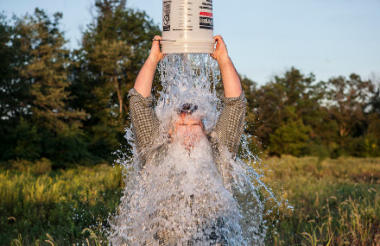Macmillan has hit back against accusations on social media that it has hijacked #icebucketchallenge, saying the craze has been raising money for cancer charities in New Zealand since July.
The challenge has peaked in publicity in the last week as celebrities in the US continue to nominate each other, while showing off their famous friends, to pour iced water over themselves and donate money to American charity ALS Association.
ALS, or amyotrophic lateral sclerosis, is the most common form of motor neurone disease.
The challenge has also become popular in the UK, with other charities including the motor neurone organisation MND Association and Macmillan Cancer Support benefitting from people's participation.
Macmillan, which has now raised over £250,000 through donations as a result of the challenge, first noticed it taking place in New Zealand around a month ago. It says that the challenge was not being done for one charity in particular, but those taking part were choosing a cancer charity to donate to.
A spokeswoman told Civil Society News: “A few of our supporters spotted it and did it for Macmillan in the UK. We thought this was fantastic and tried to encourage more people to take on the challenge for us, spreading the word to all our supporters through our social media channels and support for us has grown from there.”
The Cancer Society, a cancer charity in New Zealand, thanked those who had so far donated through the “Ice Water Challenge” in a statement dated 8 July 2014. Macmillan went on to receive its first donation as a result of the challenge on 23 July.
The ALS Association stated on its website on 12 August that it had received $4m in the two weeks since 29 July, which appears to be the date that the charity started promoting the campaign.
Former Boston College baseball player, Peter Frates, who was diagnosed with ALS in 2012, has been credited by some, including the MND Association, for helping the trend go viral. His video for #icebucketchallenge was posted to Facebook on 31 July.
The American charity has now received donations totalling $22.9m (£13.8m), as celebrities including Lady Gaga, Justin Bieber and Mark Zuckerberg take part.
Its UK-based sister charity, Motor Neurone Disease Association, said donations were started organically by one of its volunteers. It started receiving its first donations online as a result of the challenge around 8 August. Although it could not reveal an overall figure for how much it had raised through its text number and website, its Justgving account for the challenge has currently raised over £14,000.
Macmillan, which has received a lot of criticism on Facebook and Twitter for “hijacking” the hashtag, said: “Of course we’re aware of the coverage ALS have received in the US and now over here, mainly over the past week. It’s brilliant and we love how it has helped to encourage people around the world to get involved for a number of different charities."
A spokeswoman said: “To date 85,000 people have taken on the challenge for Macmillan which has raised over £250,000. This is enough to fund five Macmillan nurses for a year who will offer support to almost 800 people affected by cancer.
“While we’ve had people taking on the challenge for over four weeks, due to the ALS campaign in America over the past week or so we’ve seen this trend grow in recent days, with lots more people taking on the challenge.”
Sally Light, chief executive of the MND Association said: “The Ice Bucket Challenge is an amazing and unprecedented opportunity to raise awareness of what is a devastating terminal disease.
“We care for thousands of people affected by MND across England, Wales and Northern Ireland but we also fund global research. The amazing sums of money being donated across the world and with sister organisations in the USA and Australia too will go a long way towards finding out more about the disease for which there is no current cure.”
- Three members of staff at Civil Society Media have so far braved the ice bucket. Our intrepid subscription sales exec, Carys Pugh, accepted the challenge this morning (pictured).
An earlier version of this story incorrectly described Peter Frates as a former basketball player, rather than a baseball player.









